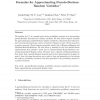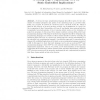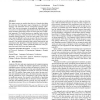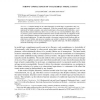2062 search results - page 25 / 413 » Derivatives of Logical Formulas |
DAM
2008
13 years 9 months ago
2008
We consider {0, 1}n as a sample space with a probability measure on it, thus making pseudo-Boolean functions into random variables. We then derive explicit formulas for approximat...
FOSSACS
1999
Springer
14 years 1 months ago
1999
Springer
Abstract. A strong (L) logic programming language ([14, 15]) is given by two subclasses of formulas (programs and goals) of the underlying logic L, provided that: firstly, any pro...
POPL
2008
ACM
14 years 10 months ago
2008
ACM
We propose a novel approach to proving the termination of heapmanipulating programs, which combines separation logic with cyclic proof within a Hoare-style proof system. Judgement...
IWMM
2009
Springer
14 years 4 months ago
2009
Springer
This paper presents an analysis that derives a formula describing the worst-case live heap space usage of programs in a functional language with automated memory management (garba...
STACS
2009
Springer
14 years 4 months ago
2009
Springer
ABSTRACT. Canonical models are of central importance in modal logic, in particular as they witness strong completeness and hence compactness. While the canonical model construction...




